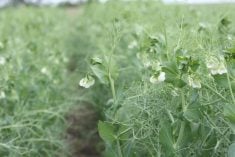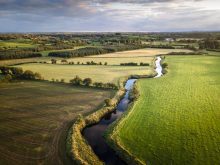The average global temperature was the hottest on record in 2024 for the second year in a row.
It’s up in the air if this concerning trend will continue for a third year.
Also uncertain is what the winds of change will bring as a new Donald Trump administration moves into the White House.
Read Also

House ag committee to undertake several studies
The House of Commons standing agriculture committee has set its agenda for the coming months. Members began the fall sitting with a two-hour update on international trade
Talk over carbon-adjusted borders faded away quickly in Canada once Trump threatened a 25 per cent tariff on goods from Canada and Mexico last fall.
Canadians have been told the country needs to position its trade and environmental policies to retain privileged access to important markets, especially the United States.
However, these economic arguments for policies designed to mitigate climate change, including the carbon tax, are being drowned out by chants of “drill baby drill” from south of the border.
Preferential access to U.S. markets is at risk, although not over environmental concerns, at least for the next four years.
This will not be the last time policies designed to mitigate climate change, by governments at home or abroad, are drastically different from the administration they replace.
The often-contradictory environmental policies of federal and provincial governments, trading partners and international organizations is a source of frustration to anyone paying attention, especially when their livelihood is tied to this market meddling.
Agriculture is often singled out as either a climate villain or possible climate change solution, and it is hard to keep up to how farmers will be affected by these ever-changing perspectives.
Even the word “sustainability” has been so enthusiastically (mis)used to promote pretty much everything under the sun that it can automatically elicit eye rolls by farmers and industry observers.
As with most trendy terms, it is important to drill down to what exactly is meant when it’s used, because it is wielded for many different purposes.
Some companies simply add this term to their company branding to greenwash their actual environmental record.
Meanwhile, other companies have undergone a drastic reorganization to incorporate measurable environmental goals.
Rarely is the word “sustainability” used to denote the economic viability of a farm or agricultural production practice.
However, farmers have been saying for years this is a critical part of the equation that can’t be ignored.
This year, returns for many crops are projected to be in the red, and in this pricing environment, many farmers will not be open to the perspectives of policy wonks preaching sustainability, who often have very little first-hand knowledge of the realities on the ground that farmers face.
It’s understandable if farmers get the urge to tune out the chatter over making Canadian agriculture more sustainable, but climate change and the discussions about it will have a profound effect on farming on the Prairies.
Farmers need to stay engaged because there’s evidence that big changes are on the horizon, in the weather, government policy and industry business models.
With the help of innovation and technology, farmers will adapt to production problems associated with a warmer climate. This will include updated production practices, varieties, crop protection products, insurance structures, water management and transportation facilities.
There are risks, but there are also opportunities.
As our understanding around soil health and the practices that support it continues to evolve, it becomes clear that farmers and the rest of society have a common interest.
That is why it’s important producers are at the table for any meaningful discussions that affect the rules involving their farms. Or alternatively, that society’s investments in soil health also become investments that secure the long-term future of the farm.
This is why we at the Western Producer created this New Horizons special edition, to help farmers stay informed on important changes in this field.
In many ways, farmers have a head start compared to other industries when it comes to reducing emissions, largely because fertilizer and feed are expensive, and farmers have been finding creative ways to be more efficient with these inputs for many decades.
It’s important policy makers understand that the pricing structure that promotes efficiency in agriculture is already in place, and it’s very effective.
There is always room for improvement, but it will likely be the creativity of farmers and other minds within the industry who find solutions that move the dial when it comes to reducing greenhouse gas emissions per unit of production.
Canadian agriculture already produces some of the most environmentally friendly food and fuel on the planet.
Incentive structure may be needed to make further gains, especially for practices that reduce emissions but do not provide an economic incentive to farmers.
It has been a long and rough road, but food companies that over-promised their sustainability targets are beginning to understand this.
There are also indications that the word “sustainability” is starting to be reclaimed from the misuse that it has suffered.
In June, Parliament passed Bill C-59, known as the greenwashing bill, that requires businesses to provide testing or substantiation to support certain environmental claims.
Environmental, social and governance (ESG) standards are also coming into effect in Canada on Jan. 1, 2025, that force large corporations to report on the sustainability of processes used to generate their products.
ESG rules will pressure large companies to clean up their supply chains, and this could eventually lead to a premium for agricultural products grown with practices that cause relatively low greenhouse gas emissions.
Farmers are intimately connected to Canada’s agriculture land and have a deep understanding of how to work within its natural systems.
“Sustainability” doesn’t have to be a dirty word, and farmers can be leaders in showing the rest of the country why it’s not.


















